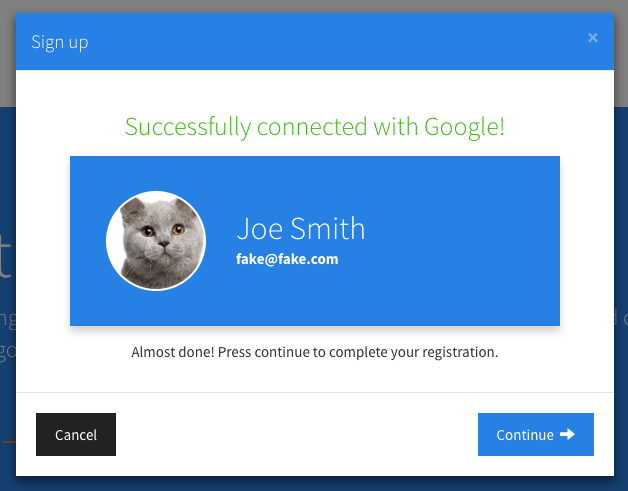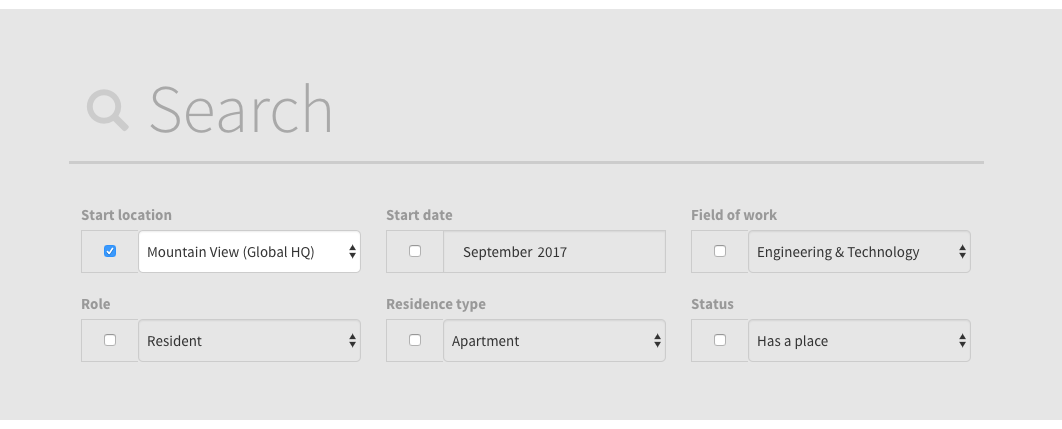by Soeren Walls
roomM8 is a place for Nooglers to find roommates. It's a Heroku web app built with NodeJS, Bootstrap, ExpressJS, MongoDB, and AngularJS. roomM8 was built by a Noogler for other Nooglers. It is a completely independent service that has no association with Google.
The purpose of roomM8 is to provide a secure and searchable database of people who will be working at Google soon and are looking for roommates. Roommates are great for several reasons:
- Someone to talk to besides yourself
- Someone to relate to about being new at Google
- Someone to watch Game of Thrones with
- Cheaper rent
When you sign up for roomM8, you'll enter some Google-specific information like where & when you will be starting at Google, as well as some practical information like how many roommates you're looking for and how important quiet time & cleanliness are to you.
After you sign up, you'll have access to the entire database of other Nooglers who have already signed up. You can easily search for people by name, field of work, Google Campus location, start date, and more. You can see what cities they're considering living in, how many roommates they want, what type of residence they want, and more.
This service uses secure protocols (https, express), authentication (passport, redis, google-oauth), and data storage (mongodb, mongoose) which you can verify by viewing the complete source code right here. I'm not perfect, so if you see anything problematic, pull requests or new issues are more than welcome!
Other users will be able to see your name, photo (if you have one), and other relevant information. However, you can choose to keep your age and gender private, and your email address is always kept private. Messages you recieve on roomM8 will be forwarded to your email, but the sender won't know your email unless you reply. Also, users can only message another user once. This is to prevent your inbox from blowing up.
Unless a Noogler shares the secret registration code with a non-Noogler (if you do, shame on you!), every user of roomM8 is a Google employee. If you believe in Google's hiring practices, this means it's a relatively trustworthy group of people.
That being said, you should of course always be cautious when talking to anyone online. If you get a message that seems fishy/sketchy, just ignore it. If you become suspicious that someone might not be a Noogler, ask for proof. If you are harassed or believe someone is abusing the service, please report them immediately. Ultimately, however, roomM8's creator cannot be held responsible for anything bad that happens.
Yes. If at any time you wish to stop receiving messages from other users and temporarily hide your profile from the public listing, just click the 'Hide profile' button. To unhide your profile, click the 'Show profile' button.
Yes. Once you're done using roomM8, hopefully after you've found a fantastic roommate, it's very easy to delete your account and permenantly erase all your info from the database. This action cannot be undone.
Want to deploy your own copy of roomM8?
You will need:
- A Heroku dyno (can be local)
- A Redis Cloud database to store persistent user sessions
- A MongoDB database to store user account data
- A Google Cloud Platform project with an OAuth 2.0 client ID
-
Run
git cloneor download the source code -
Run
npm installin root directory to install dependencies -
Download heroku CLI and run
heroku create -
git push heroku master -
Create MongoDB collections called
TestUsersandUsers, and a db user with read/write access -
Set heroku config vars specified in
config/auth.jsIf your Heroku dyno is online, the config vars can be set in your Heroku app dashboard. Otherwise, if it's a local dyno, make a new file called
.envin the root folder. Be sure to keep this file private (never commit it to a git repository), as it will contain highly sensitive information. Here is what the.envfile should contain:SESSION_SECRET='some_random_long_string' # You set this SECRET_KEY='the_secret_code_for_signing_up' # You set this GOOGLE_CLIENT_ID='xxx.apps.googleusercontent.com' # Get this from Google Cloud Platform API dashboard GOOGLE_CLIENT_SECRET='yyy' # Get this from Google Cloud Platform API dashboard GOOGLE_CALLBACK_URL='http://localhost:5000/auth/google/callback' # Must match value in Google Cloud Platform API dashboard MONGO_DB_URL='mongodb://<user>:<pass>@<host>:<port>/<db>' # Get this from MongoDB server REDISCLOUD_URL='redis://rediscloud:<pass>@<endpoint>:<port>' # Get this from Redis Cloud account USE_SECURE_COOKIES=true # You set this NODEMAILER_TRANSPORT='smtps://<your_support_email>%40gmail.com:<pass>@smtp.gmail.com' # Doesn't have to be gmail FORCE_SSL=true # You set this
-
(Local only) Run
heroku local devand navigate to http://localhost:5000
Copyright 2017 Soeren Walls
Licensed under the Apache License, Version 2.0 (the "License"); you may not use this file except in compliance with the License. You may obtain a copy of the License at
http://www.apache.org/licenses/LICENSE-2.0
Unless required by applicable law or agreed to in writing, software distributed under the License is distributed on an "AS IS" BASIS, WITHOUT WARRANTIES OR CONDITIONS OF ANY KIND, either express or implied. See the License for the specific language governing permissions and limitations under the License.

